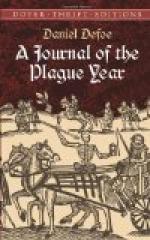2. As merchandising was at a full stop, for very few ships ventured to come up the river and none at all went out, so all the extraordinary officers of the customs, likewise the watermen, carmen, porters, and all the poor whose labour depended upon the merchants, were at once dismissed and put out of business.
3. All the tradesmen usually employed in building or repairing of houses were at a full stop, for the people were far from wanting to build houses when so many thousand houses were at once stripped of their inhabitants; so that this one article turned all the ordinary workmen of that kind out of business, such as bricklayers, masons, carpenters, joiners, plasterers, painters, glaziers, smiths, plumbers, and all the labourers depending on such.
4. As navigation was at a stop, our ships neither coming in or going out as before, so the seamen were all out of employment, and many of them in the last and lowest degree of distress; and with the seamen were all the several tradesmen and workmen belonging to and depending upon the building and fitting out of ships, such as ship-carpenters, caulkers, ropemakers, dry coopers, sailmakers, anchorsmiths, and other smiths; blockmakers, carvers, gunsmiths, ship-chandlers, ship-carvers, and the like. The masters of those perhaps might live upon their substance, but the traders were universally at a stop, and consequently all their workmen discharged. Add to these that the river was in a manner without boats, and all or most part of the watermen, lightermen, boat-builders, and lighter-builders in like manner idle and laid by.
5. All families retrenched their living as much as possible, as well those that fled as those that stayed; so that an innumerable multitude of footmen, serving-men, shopkeepers, journeymen, merchants’ bookkeepers, and such sort of people, and especially poor maid-servants, were turned off, and left friendless and helpless, without employment and without habitation, and this was really a dismal article.
I might be more particular as to this part, but it may suffice to mention in general, all trades being stopped, employment ceased: the labour, and by that the bread, of the poor were cut off; and at first indeed the cries of the poor were most lamentable to hear, though by the distribution of charity their misery that way was greatly abated. Many indeed fled into the counties, but thousands of them having stayed in London till nothing but desperation sent them away, death overtook them on the road, and they served for no better than the messengers of death; indeed, others carrying the infection along with them, spread it very unhappily into the remotest parts of the kingdom.




